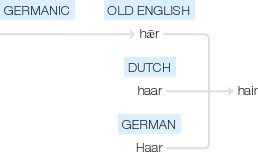Hair
Old English hǣr, of Germanic origin; related to Dutch haar and German Haar .
wiktionary
From Middle English her, heer, hær, from Old English hǣr, from Proto-West Germanic *hār, from Proto-Germanic *hērą(“hair”), of uncertain origin. Cognate with Saterland Frisian Hier(“hair”), West Frisian hier(“hair”), Dutch haar(“hair”), German Low German Haar(“hair”), German Haar(“hair”), Swedish and Norwegian hår(“hair”), Icelandic hár(“hair”). Eclipsed non-native Middle English cheveler, chevelere(“hair”), borrowed from Old French chevelëure(“hair, head-hair, coiffure, wig”).
etymonline
hair (n.)
Old English hær "hair, a hair," from Proto-Germanic *hēran (source also of Old Saxon, Old Norse, Old High German har, Old Frisian her, Dutch and German haar "hair"), perhaps from PIE *ghers- "to stand out, to bristle, rise to a point" (source also of Lithuanian šerys "bristle;" see horror).
Spelling influenced by Old Norse har and Old English haire "haircloth," from Old French haire, from Frankish *harja or some other Germanic source (see above). Hair-dye is from 1803. To let one's hair down "become familiar" is first recorded 1850. Homeopathic phrase hair of the dog (that bit you), remedy from the same thing that caused the malady, especially a drink on the morning after a debauch, 1540s in English, is in Pliny.
